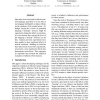Free Online Productivity Tools
i2Speak
i2Symbol
i2OCR
iTex2Img
iWeb2Print
iWeb2Shot
i2Type
iPdf2Split
iPdf2Merge
i2Bopomofo
i2Arabic
i2Style
i2Image
i2PDF
iLatex2Rtf
Sci2ools
107
click to vote
EACL
2010
ACL Anthology
2010
ACL Anthology
Towards Empirical Evaluation of Affective Tactical NLG
One major aim of research in affective natural language generation is to be able to use language intelligently to induce effects on the emotions of the reader/ hearer. Although varying the content of generated language ("strategic" choices) might be expected to change the effect on emotions, it is not obvious that varying the form of the language ("tactical" choices) can do this. Indeed, previous experiments have been unable to show emotional effects of tactical variations. Building on what has been discovered in previous experiments, we present a new experiment which does demonstrate such effects. This represents an important step towards the empirical evaluation of affective NLG systems.
Affective Natural Language | Affective Nlg Systems | EACL 2010 | Generated Language | Natural Language Processing |
Related Content
| Added | 29 Oct 2010 |
| Updated | 29 Oct 2010 |
| Type | Conference |
| Year | 2010 |
| Where | EACL |
| Authors | Ielka van der Sluis, Chris Mellish |
Comments (0)

